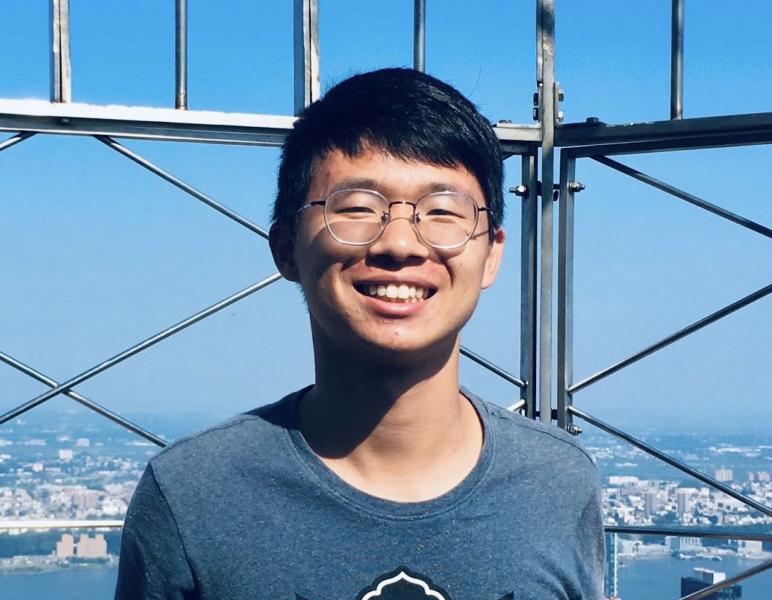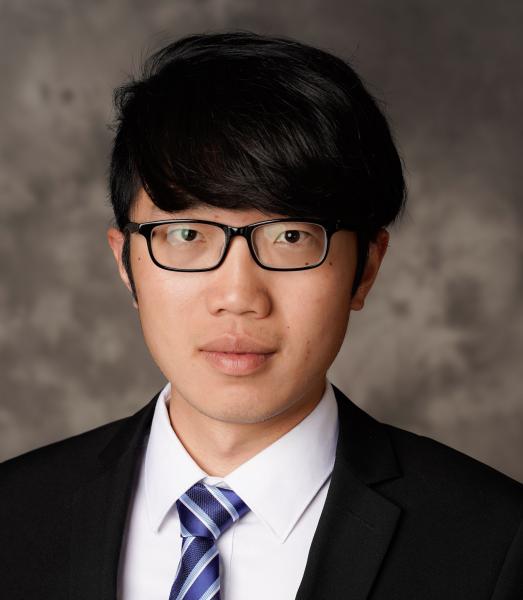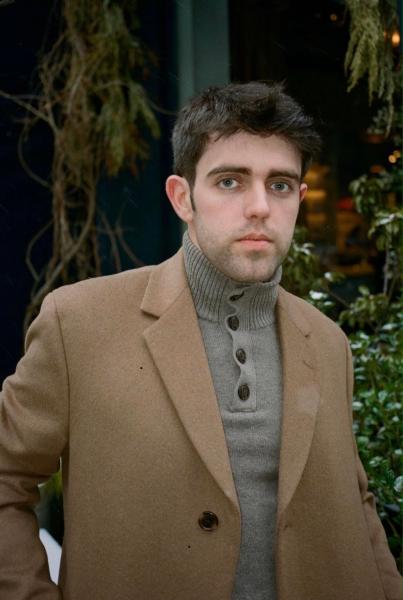George funkenbusch
 George Funkenbusch (Chambers Fellow) is a first-year Ph.D. student in Biomedical Engineering. He graduated Summa Cum Laude with a B.S. in Optics from the University of Rochester. As an undergraduate, he worked with Doctor Michael Giacomelli on designing ultrafast detectors for multiphoton microscopy. He currently researches quantitative phase imaging under Doctor Adam Wax. Specifically, he hopes to develop flow cytometry systems for high-throughput diagnosis of diseased cells.
George Funkenbusch (Chambers Fellow) is a first-year Ph.D. student in Biomedical Engineering. He graduated Summa Cum Laude with a B.S. in Optics from the University of Rochester. As an undergraduate, he worked with Doctor Michael Giacomelli on designing ultrafast detectors for multiphoton microscopy. He currently researches quantitative phase imaging under Doctor Adam Wax. Specifically, he hopes to develop flow cytometry systems for high-throughput diagnosis of diseased cells.
Yuxin lin

Yuxin Lin (Chambers Scholar) is a second-year Ph.D. candidate in the Department of Chemistry. Yuxin graduated from Zhejiang University, Hangzhou, China with a B.S. in Pharmaceutical Science. At Duke, he works under the guidance of Dr. Kevin Welsher. Based on a novel single particle tracking method developed in Welsher Lab, 3D Tracking and Imaging Microscope (3D-TrIm), Yuxin’s research focus on acquiring detailed information of particle-cell interaction in the first line of defense: the epithelium. By tracking single viral particle in real-time while simultaneously 3D imaging the surrounding environment, he can correlate the viral diffusive behavior with cellular and extracellular structure to uncover the mechanisms of how virus penetrate the epithelial layer. Similarly, transepithelial diffusion of nanoscale therapeutics can be directly observed to aid the relational design of drug delivery cargoes from the aspect of size and composition. His ultimate goal is to use these methods to tackle real-life problems in complex and disease-relevant systems, such as visualizing the dynamic of nanoscale chemotherapy agents as they traverse poorly vascularized tumor tissue.
Yuan Tian

Yuan Tian (Chambers Scholar) is a third-year Ph.D. student under Dr. Joseph Izatt in the Department of Biomedical Engineering. He received a Bachelor of Engineering in Automation from Zhengzhou University, Henan, China, and a Master of Science in Electrical and Computer Engineering from Duke University, Durham, NC. His research interest is optical coherence tomography (OCT) guided medical robots. His recent work is about OCT-guided robotic deep anterior lamellar keratoplasty (DALK), a corneal transplant surgery. For the image processing part, to correct the cornea and surgical needle light refraction in 3D OCT volumes during corneal surgery, he proposed an algorithm to estimate the corneal phase index based on the readily measured group index. He also developed a method to quantitatively evaluate the refraction correction results on the DALK needle. For the robotics part, he invented a calibration algorithm to optimize the transformation matrices from the robot base frame to the OCT scanner frame, and the robot end effector frame to the needle tip frame simultaneously. His current research is on robotically aligned OCT (RAOCT), which attaches the OCT scanner at the end effector of the robot. He is developing a system using RAOCT to track cells in the human eye’s anterior chamber to improve anterior chamber related disease diagnoses.
melissa wu
 Melissa Wu (Chambers Fellow) is a first-year Ph.D. student in the biomedical engineering department, working with Dr. Roarke Horstmeyer. She is currently developing optical technologies for non-invasive measurements of cerebral blood flow. Her recent work explores several approaches to apply advanced single-photon detection technologies to capture fast physiological measurements. Prior to Duke, she received her master’s degree in statistics at Columbia University, where she worked on machine learning methods to analyze neural imaging data. Before that, she was a research assistant at the Martinos Center for Biomedical Imaging, working on computational methods in optical imaging. Melissa received her B.S. in physics from Duke University.
Melissa Wu (Chambers Fellow) is a first-year Ph.D. student in the biomedical engineering department, working with Dr. Roarke Horstmeyer. She is currently developing optical technologies for non-invasive measurements of cerebral blood flow. Her recent work explores several approaches to apply advanced single-photon detection technologies to capture fast physiological measurements. Prior to Duke, she received her master’s degree in statistics at Columbia University, where she worked on machine learning methods to analyze neural imaging data. Before that, she was a research assistant at the Martinos Center for Biomedical Imaging, working on computational methods in optical imaging. Melissa received her B.S. in physics from Duke University.
zane zemborain

Zane Zenon Zemborain (Fitzpatrick Scholar) is a 3rd year Ph.D. student in Dr. Sina Farsiu’s Vision and Image Processing laboratory in the Department of Biomedical Engineering. He was born in Buenos Aires, Argentina and came to the United States as a child. He graduated from Columbia University in NYC with a degree in biomedical engineering and minors in computer science and electrical engineering. He conducted multiple years of research under Dr. Donald Hood where he worked on novel optical coherence tomography (OCT)-based diagnostic methods for glaucoma. He also interned at an OCT company, Heidelberg Engineering, in Germany where he worked on deep learning-based segmentation algorithms for the optic nerve head. His research at Duke University, under the mentorship of Dr. Farsiu, focuses on the use of deep learning and optical imaging to facilitate research on ophthalmic disease diagnosis, disease progression, structure-function relationships, and responses to drug therapy. In collaboration with Dr. Victor L. Perez, at the Duke Eye Center, he is currently working on producing a multi-step, deep learning-based model for diagnosing eyes with ocular surface diseases. Similarly, in collaboration with Dr. Glenn Jaffe, he is currently working to produce a fully automated foveal invasion metric pipeline for eyes with geometric atrophy.
